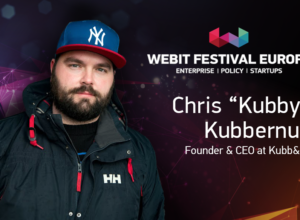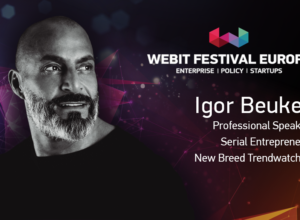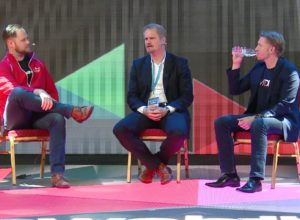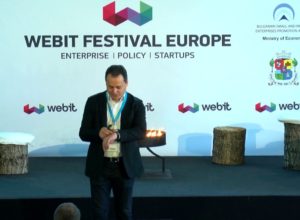Mayors, administrators and policy makers meet the best in smart cities...
Join the mayors and top city administrators from Sofia, Rome, Paris, Amsterdam, Barcelona and over 50 more cities (as of today) from Europe at the 10th edition of Webit.Cities Summit (one of the 12 parallel events of Webit.Festival Europe).
Some of the participants of Webit include:
- Mariya Gabriel, Commissioner for Digital Economy and Society, European Commission
- Carlos Moedas, Commissioner for Research, Science and Innovation, European Commission
- Yordanka Fandakova, Mayor of Sofia
- Virginia Elena Raggi, Mayor of Rome
- Francesca Bria, Chief Technology and Digital Innovation Officer, City of Barcelona
- Ger Baron, Chief Technology Officer, City of Amsterdam
- Carl Bildt, Chair, Global Commission on Internet Governance
- Bogomil Balkansky, Vice President, Google
- Yonov Frederick Agah, Deputy Director-General, World Trade Organization
- Mari Kiviniemi, Deputy Director-General, OECD
- Catherine Carlton, Mayor elect (2014 and 2015) Menlo Park City and current city council members, Silicon Valley
- Juraj Vaculik, CEO, Aeromobil
If you'd like to see them all in person, listen to their experience and talk to them, please, book your ticket here, still at an early bird price.
Put your brand in front of the EU mayors, top city administrators and the people responsible for implementing smart city solutions within their respected municipalities and meet your next client or business partner among 7000 + attendees, 1500 of which top European policy makers from 110 countries. Request the Webit.Cities sponsorship brochure or join over 200 exhibitors
[youtube https://www.youtube.com/watch?v=z8D7ZENtxCE]
Investments in FinTech
Though the moderator of the panel was still sitting on his plane, being late for leading the discussion, the Advisor at 8VC Jon Soberg, the founder and co-CEO of H-Farm Maurizio Rosi & the Investment Director at iTech Capital Alexey Telnov managed to deliver their experience and insights in the discussion about Investments in FinTech at Webit.Festival 2017.
Stay tuned with the latest innovations by booking a ticket to Webit.festival Europe 2018
Technology is changing everything, in all sectors, businesses and business models and has an impact on society in the daily lives of millions of people. Technology is effective once it’s combined with the next generation.
FinTech is data
Money is data too, they represent the value. As we’ve already entered a “data age”, there’s much more consciousness about the data. From online payments through digital wallets and asset management, this is a pretty vast area of settling a company and acquiring a market segment of. As for FinTech where the area has been controlled by the big banks and large organizations until recently, now we see more and more startups creating new products and truly having an impact. Even though it’s getting more crowded in the last few years, this market still provides probably the biggest opportunity that’s out there in terms of a market.One of the advantages of investing in FinTech is that one always knows where the money come from
By default, FinTech companies are dealing with money so that makes an investor’s job easier in order to track the flows. This area is fairly straightforward when it comes to a particular business model and the way the business works. The market for financial services is more than enough large so nobody has to ask questions about the size of the market or how companies in the sector will make money. The question is whether they can execute and succeed. The buzz in FInTech naturally raises the question of security: security solutions and their integration in FinTech products and services. Companies are putting more and more information on the cloud so security is a sensitive issue in all areas and needs to be paid proper attention to. Companies operating in this domain need to deal with regulations, licences and still find a way to keep their customers data secure.Webit.Festival Europe 2018 presents: Chris ‘Kubby’ Kubbernus
Here you can see a full list of the confirmed speakers at Webit.Festival, while here you can get all the information you need about the tickets for the event.
We need to go back to good, credible and authentic storytelling that brings value to the consumer
The notion of change is essential in the 21st century. We are developing way faster than we thought we would in 2008, for example. We now consider diseases treatable, in comparison with just 10 years back; companies have to adapt to change, but this would be impossible without certain people - people who envision the future, who encompass change and apply it. Chris Kubbernus, or Kubby, as his friends call him, named #1 Business Guru on Snapchat by Forbes, will be among the speakers at Webit.Innovate! Summit at the next Webit.Festival Europe 2018 on 26th - 27th June 2018. The one thing Chris wishes people to remember out of his talk would be that things change. According to him, companies today are not using technologies to their fullest potential - not seeing what’s happening in the marketplace and cannot react adequately.“ If you say to an organization: 'I think you should use Snapchat, or get on Instagram', they’d roll their eyes and say: 'Why would we do that?’ What they don’t realize is that these things quickly become mainstream, and that’s where they’re losing. They’re actually ignoring what’s going on in the marketplace, thinking that it’s just a trend and therefore not doing anything about it. Change happens and organizations have to recognize that and act on it before it gets too expensive.”
Chris is originally from Canada, but he likes to say that he was “imported in Denmark” by his wife. The difference in the two continents is obvious, in terms of marketing, but what exactly Chris finds drastically different is:Americans and Canadians are more trusting in their advertising. If you make a claim, they might take that as face value, whereas I think with Europeans, you have to have a more soft approach.
Living in Northern Europe, Scandinavians, he continues have a different approach to advertisement. People there are more likely to doubt the quality of the product whereas the Americans would trust the ad and will expect the same results.In social media, I find that Europeans are more conservative. They are less likely to share and like something or to engage with content. I think it takes a lot to move them to action, where in North America, in particular, it seems to be easier. People are more relaxed towards sharing on social media and voicing their opinions.
Chris was a speaker at the first Snapchat conference - we saw the rise of Snapchat, we all know those Snapchat glasses, don’t we. We are now also seeing the fall of Snapchat as a platform, it doesn't attract so much audience, in fact, its users are youngsters. It just somehow feels Snapchat will not last much longer, although, Chris says, you have to wonder why the biggest social networks in the world are mimicking what Snapchat did.“ I think, in a way, Snapchat is being replaced by Instagram. Instagram is doing a very good job of copying and making their own new features. But Snapchat is a playground, still much more than Instagram. And Facebook sees that they are losing the younger generation, so I think that if Snapchat can continue being the anti-Facebook, they will stay relevant. They just need to retain that identity. “
Besides Facebook, another huge platform is so very widely used - Instagram. The main differences in the two platforms, Chris explains like this:On Facebook, content is consumed slower and with more thought. People are less likely to like on Facebook, whereas on Instagram, there’s less exposure and more anonymity. Instagram is a little hedonistic in some ways, while Facebook is your core of friends and family, where you have to be more ‘considerate'.
Unlike some other social platforms, like Snapchat, for example, Facebook will be present in our lives for many more years. It is a place where you can document your entire life and in terms of ‘replacing’, Instagram will not replace Facebook as a social media platform. At the end of the day, “both platforms are playgrounds for displaying different parts of our personalities”. My social media predictions for 2018 is a continuation and examination of influencer-marketing and how much we let social media influence us, says Kubby. The psychological effect of social media will continue to determine the way we communicate and perceive information and the trend of what is real and what is fake will determine the consumer’s behaviour.“ Right now, digital marketing is losing consumers because of disinterest and mistrust in fake influencer-marketing. We need to go back to good, credible and authentic storytelling that brings value to the consumer. “
Perspective from the pharma industry to value-based care
Stamen Popov, the Novartis Oncology Business Unit Head for Bulgaria & Macedonia was a keynote speaker at Webit.Festival 2017. His keynote covered the topics about the “from cost to value ” conversion in healthcare and treatment.
Healthcare spending is increasing faster than than the current economic climate’s capabilities
Many countries are concerned that higher spending doesn’t lead to proportionally better outcomes. Healthcare systems waste a significant amount of resources that limits the fiscal space and hinders performance. The largest percent of wasted resources goes to over-hospitalization, over-examinations and over-prescription of pills. Waste is also created by inefficient or flawed rules, overly bureaucratic procedures and poor execution or lack of best practices, e.g. effective preventive care or patient safety, low volume for specific treatments per hospital, etc. Mr Popov made a point that the most expensive pill appears to be the one which hasn’t delivered any positive effects to the patient. The pricing in the industry has to start evolving with accordance to the fast paced changes in technology and the development of new ways of treatment. Companies should to be paid for a result delivered, not for a specific pill. A shift needs to be made in pricing, away from what has been a transactional approach to a value-based approach. That should mean focusing on the outcomes and really communicating the value of the medicines and pricing them accordingly. Care routed in outdated habits, ignoring scientific findings and motivated by something other than optimal care shouldn’t be the care of today.Focusing on value-based care, reducing waste and directing investments to the point where greater value can be produced is critical for sustainability.
Universal health care aspirations will be hard to materialize if we don’t shift to value-based care and change policies to support this shift. This change requires collaboration with every member of the healthcare ecosystem and better public-private partnership. Healthcare systems should stimulate more effective treatment results with the help of all parties involved in the process - patients, medics, researchers, healthcare providers and pharma companies. If you want to stay up-to-date check the Webit.Festival website for upcoming speakers and our ticket options.The transforming world of payments
Visa is not the first credit card!
Maybe it’s no news for you, but for the majority of the audience of the Red Stage at Webit Festival, it certainly was. The one who made that revelation is the General Manager of Visa for Israel, Mr. Oded Salomy. He had a keynote at last year’s edition on enabling the transforming world of payments. Visa is one of the names that probably need no introduction. “Visa” has become a nickname for our payment cards. So much, that people tend to there’s much more behind it than just a plastic for payments. Payments is such a vast area that it’s quite unpredictable what the future will bring. We never know what’s going to impact payments and the booming fintech industry. Everyday payments, business to business payments, business to customer payments and reverse.. Machines paying other machines rather than humans, biometrics being used in order to identify people by their biological characteristics.. All the way up to crypto currencies and tokens. New services, easier to work with and keeping a proper security level are needed by this ever evolving system. Numerous startups have been trying to be the next “big thing” that will shake the world of payments as the price of Bitcoin did some time ago.In the Internet of Things space things have been connecting to Fintech too
Wearables such as rings, bracelets, wrist-watches and keychains are becoming more than just accessories - there are already ones out in sale that can allow us to pay on the move. Another category that’s being impacted is the connected cars. With just an Internet connection we can pay for grocery, for gas, parking, insurance while going to work or some more without the need to get out of the vehicle. And last but not least, check the Webit.Festival website for upcoming speakers and our ticket options.Webit.Festival Europe 2018 presents: Igor Beuker
Advertising may win quarters, innovation wins decades
He is a new breed trendwatcher, energetic professional communicator, serial entrepreneur, award-winning marketing strategist and this will be his 4th Webit event - three times in Sofia and once in Istanbul, Igor Beuker has lots to share about his Webit experience.“ Amazing conference, very well-organized, fantastic setting and backstage program, great speaker line-up, and very important to me as a professional public speaker and human being: the connection with the audience (at the event and on social media) is rare and heartwarming. “
Igor is among those speakers who have a special connection with their audience. Here is what he says about the audience in Sofia, and to his fans, in particular:“ The connection with the audience in Sofia, is really one of a kind. I can’t explain the feeling.It’s one of the reasons why - out of 150 international talks each year - Webit is one of the highlights I really look forward to ”
We cannot deny that the difference between Sofia and Istanbul is enormous. Here is what Igor says about his experience:
“ Istanbul is a huge international city and the conference is a bit more business focused and formal than in Sofia, was my experience. I love the culture and the passion of the people in Turkey, and some of the attendees became business partners and friends.”
Bulgaria and Sofia are aiming at becoming a digital hub for CEE and the attitude and approach towards this is a bit more casual. In the same time, however, we coordinate with the government and local authorities, and as from last year, we were incredibly proud to announce that Webit is the flagship event of the Presidency of the Council of the European Union. The EU Commissioner for Digital Economy and Society Mariya Gabriel is chairing Webit's Plenary Sessions and is a patron of Webit.Festival along with The Government of Bulgaria and the Mayor of Sofia.” Last year I shared the stage and the dining table with the president of Bulgaria and the Mayor of Sofia, which is a great opportunity to share ideas.”“Burning Man meet TED” and “Math Man in a world of Mad Men”...
...are just a couple of the new terms that were invented by the Bulgarian audience. At this year’s Webit.Festival Europe edition in Sofia, Igor will further develop his Mad Men vs. Math Men theory."Can I stretch my Mad Men vs. Math Men theory and framework even further? The Webit audience will give me the answer with their reviews and social feedback. My team and me value what they say and I even reinvent my speeches and one-liners for my talks, based upon what they highlight. That legacy brands and incumbents need to get out of their comfort zones, because that’s where the magic really happens. My bold style and personality I can’t change at 47, but the audience feels I know my why and I keep walking towards my purpose. Next-level change and reinvention is needed. Big is only good when big is smart: Advertising may win quarters, innovation wins decades.”
Igor is loved by the companies, adored by his fans and audience everywhere he goes and also by the media.
He gave a very special, exclusive, interview for a Bulgarian media. You can watch his interviews here, where he elaborates his Mad Men vs. Math Men theory in a more simple way. Igor’s answer to “how would you describe the atmosphere at Webit, he says: “Hard to describe, but when I look at the audience tweetback on my site, I get a huge smile on my face and I can’t wait to be back!”We can’t wait to welcome you again, Igor! You have a very special place in our city and our hearts.
“ Experiencing the last three years, I expect Webit 2018 to be even bigger and better than the previous editions. If that is even possible.”
Sure it is! You don’t believe us? Take a look at the amazing speakers line here and the one of the kind networking opportunities here. You wish to attend? Book your ticket here.Dancing with an Elephant: Corporates & Startups
Apply for our Founders Games and get the chance of being among the 200 startups presenting their innovative idea in front of investors, business leaders and all attendees of Webit.Festival 2018.
Corporates & startups. Two forces of the business world which are as much different as they need each other. Brian Collins (AngelHack), Jonas Jacobi (IBM) & Matthias Schanze (Siemens) put some light on this complex relationship Mr. Schanze described as”Dancing with an elephant”
The open API (Application Programming Interfaces) revolution took of 5 years ago
A familiar example of APIs in action is the ability to sign into different accounts or services with our Facebook login. We can log into Pinterest, for example, by using our Facebook login credentials. That revolution was built on the idea that corporates could start opening up their technology for developers & startups. By doing so they were able to find a whole new strategy. In that way, the strategy shifted. It shifted from a B2B or a B2C focus to a Business to Developer focus. As such, innovation programming quickly went on the rise. Corporates began looking at developers and startups as a whole new strategy to their strategic plans and in doing so they’ve started working and finding ways to engage with startups & developers at an earlier and earlier stage.Why the relationship between startups & corporates is important
Big companies have more than enough funds to put in place and do their own research. What these companies have noted is that a lot of innovation occurs outside the company itself. That’s one of the main reasons companies like IBM, Siemens and others of this size have been involved in the startup ecosystem for quite some time already. Startups do set trends and it’s important for large corporations to always keep an eye on new trends and new technologies that are emerging fast. So what are these companies looking for? Big ideas. Great technologies. And innovations. Innovations that disrupt industries and possibly create new markets. Transformation, not only for the company itself but for its clients as well.Value proposition to the corporates
Corporates are well aware that they cannot invent everything by themselves. Co-creation and co-innovation with startups is a key point of their development. The transition is turning from internal Research & Development departments inside of corporates towards creating an external community, a liquid R&D force in essence. There’s the notion that most big corporates engage with, acquire or invest their funds in startups that already make some millions of revenue but in reality that is not the case anymore. The practice of an early engagement has grown immensely and that calls for more fair chances for more startups.Do borders matter in the digital world?
At last year’s Webit.Festival in Sofia the topics and discussions on Big Data were more than plenty. This comes as no surprise since in the last few years the world’s population has generated more data than ever coming from all kinds of connected devices. “Big Data” has become the buzzword of our time, creating more and more… buzz.
Mr. Peter Rahnev is the CEO of oblak.bg - the first Bulgarian company to start exposing a limitless scalability and unending possibilities of cloud computing technology. His keynote at the festival laid out his vision on how regional cloud providers are becoming more and more equally important standing next to the global ones.
Global and local service providers both have their strengths and weaknesses
When your business is connected to a global service provider, it is very much dependent on the Internet connectivity. This connectivity can be easily regulated, manipulated and restricted by governments. Wars and terrorism, Rahnev says, have been affecting both the physical and digital world. Countries have been disconnected from Internet services, social networking and a free access to information. To the 21st century contemporary human, such restrictions on the Internet usage probably equal to “social death” as the saying goes.A good example on how governments put restrictions on one another...
...is the sanctions to the Russian federation in 2014. One of them was the threat of being banned from the electronic payments system. The outcome might have been a bit unexpected to a certain level - the Russians have created their own system for electronic payments in response. Regional service providers have the advantage of flexibility. The local connectivity inside a country would be able to allow businesses to maintain their operations while there’s an unexpected global crash or restrictions applied. One wouldn’t have to worry which borders the data they’re storing crosses, where it is, where it goes and which regulations should be complied.Megatrends in Healthcare
Webit.Festival Europe 2017 shaped the milestones for all things digital in healthcare
The topic will be continued in 2018 with a separate 2-day event called Webit.Health co-chaired by Plamen Russev, the Chairman of Webit Foundation and Prof. Shafi Ahmed, Co-founder and surgeon of Medical Realities. Make sure to book your tickets now, at the Super earlybird price here. 2017 health Summit saw some of the biggest companies’ representatives in the world sitting together in a panel discussion - Rumyana Trencheva, Managing director SAP SountEast Europe, Mr Omer Saka, Partner at Deloitte, Dr Stamen Popov, General Manager Oncology of Novartis and Milena Stoycheva, CEO of JA Bulgaria, moderated by Dr. Rosen Dimitrov, Public Affairs Manager at Novartis. You have a vast experience in healthcare and innovations and wish to tell us about it - apply for speaking here. Ms Trencheva gave a good start of the discussion assuring that megatrends all over the world are not something selected, they are not happening in selected, VIP, countries - they are spreading. The contemporary consumer is demands more and more from the pharmaceuticals, from the technology companies and it is becoming ever more challenging to make sure consumers’ needs are met.The change of our perception on what healthcare is
Another megatrend that was clearly stated by Mr Saka is the change of our perception on what healthcare is do we mean a pill, a medical device of some kind or a hospital bed. The key solution is finding a way for these three elements to work together in the modern healthcare system. Furthermore, the matter of how much we, as consumers, pay for healthcare came to forefront. It is expected that in the next 10 years or less patients will be treated and will be provided with solutions that go beyond the pill - and this is for the mass, not only for the selected ones who can afford it. Dr Popov clearly stated that pharmaceutical companies no longer rely on the pill as a method of treatment - they broaden their vision using the digital technologies and these solutions will very soon come to patients who need them. This gives a huge advantage - transparency. Each of us, as human beings, is a data center, based on the choices we make every single day. In fact, transparency in healthcare system is a major block each of the technology companies all over the world are trying to achieve.With this follows one of the most important Megatrends - prevention as the form of treatment
It is considered that people nowadays take more and more care of themselves - in the form of wellness. We will have a huge number of population taking great measurements to maintain their health; in order to survive, people will take ownership on one’s health, environment and the ecosystem as well as putting efforts into changing the ecosystem. Finally, all these megatrends are impossible to happen without collaboration of technology companies, startups to bring fresh ideas and doctors. There’s no need for an engineer to develop an app by himself when they clearly don’t know specifics, rather, it is the healthcare industry to develop and change the ecosystem. Going out of the pharmaceutical industry, the biggest companies are also working on building connections with physicians and to use these relations to integrate new type of companies into this world. Webit.Health will continue this kinds of discussions in 26th - 27th June with ever more interesting guests who will show in action and demonstrate the modern healthcare - something that is happening now, not some time in the future. If you have an interesting idea and your company is less than 5 years old - show it by applying here.Central & Eastern Europe risk-capital ecosystem on the world’s map
Webit.Festival - a place for minds to meet. Marius Ghenea, the Investment Director of 3TS Capital gave a keynote at last year’s edition about seizing opportunities and avoiding pitfalls in the fast-growing Central & Eastern Europe risk-capital ecosystem.
3TS Capital has been investing in countries in the CEE region for quite some time and Marius, as a serial entrepreneur and angel investor himself has gained deep insight on the specifics of this market.
Though being quite underestimated in the years back in time, CEE is slowly but surely getting its footprint in business, tech and innovations. The region has drawn attention not only with unicorns such as Skype, Avast, Transferwise and AeroMobil but also with the emergence of multiple, active and growing startup ecosystems across and around.









